
How can diabetes identity be about social change, you ask? Oh, let me share with you my recent publication.
A thread.
QR code will take you to the article. Also, linked below.
#Diabetes #t2d #t1d #dsma #Insulin4all #AcademicChatter
A thread.
QR code will take you to the article. Also, linked below.
#Diabetes #t2d #t1d #dsma #Insulin4all #AcademicChatter
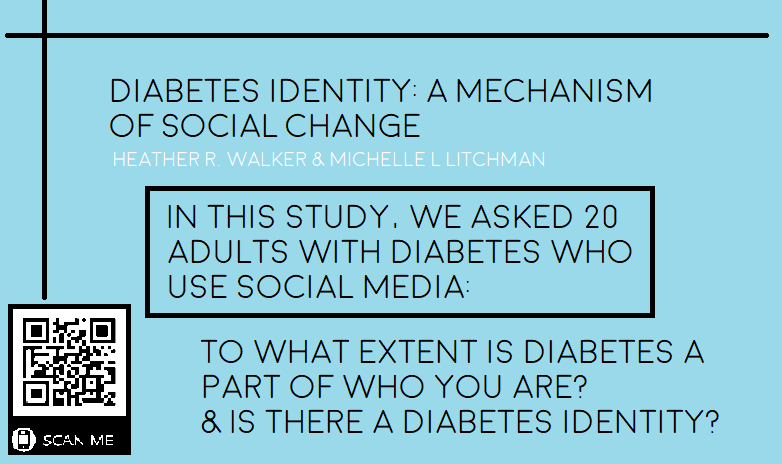
Starting in 2017, I set out to understand how people with diabetes were politicizing the condition of diabetes online. And one of the areas that I was especially interested in was identity.
journals.sagepub.com/doi/10.1177/10…
journals.sagepub.com/doi/10.1177/10…
However, when I looked up other published studies on diabetes identity, everything I found was centered around compliance. Researchers and HCPs were only interested in diabetes identity to the extent that it improved a person's willingness to perform self-management behaviors.
Having lived with diabetes myself for 15 years at that point, I knew there was more to diabetes identity than the daily grind of DOING diabetes things.
So I asked 20 adults with diabetes about it.
So I asked 20 adults with diabetes about it.
Before just coming out and asking about identity, I asked folx why they talk about diabetes on social media.
They said that diabetes was misunderstood by the masses and that others with diabetes internalize the BS stereotypes sometimes.
They said that diabetes was misunderstood by the masses and that others with diabetes internalize the BS stereotypes sometimes.
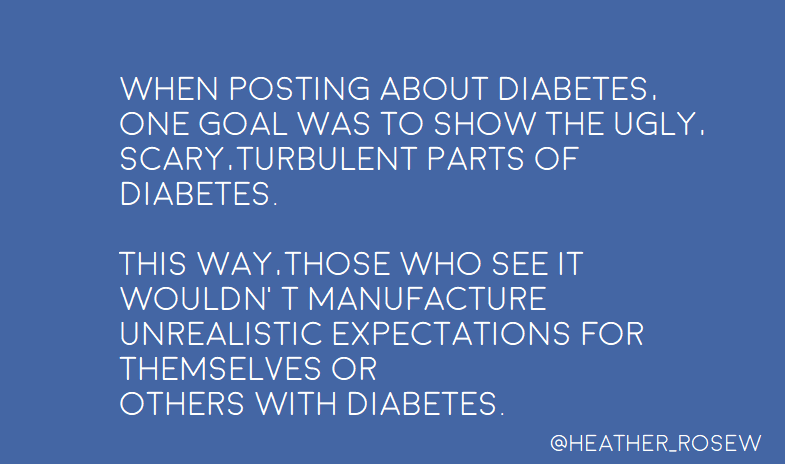
Talking about diabetes online disrupts harmful representations of diabetes by exposing the complexities of what it is actually like to live with.
And showcasing those complexities was really important to interviewees.
And showcasing those complexities was really important to interviewees.
Helping people with and without diabetes to see how complex it is to live with diabetes was a top priority for those interviewed.
During the interview, I asked a fun question that drew out this reasoning...
During the interview, I asked a fun question that drew out this reasoning...
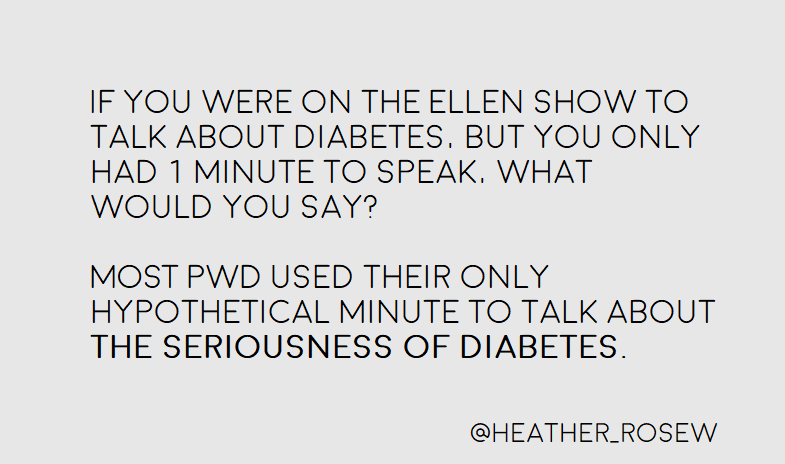
Think about that. People got 1 minute on @TheEllenShow to talk about diabetes. And they wanted the world to know that diabetes is difficult, complex, & serious.
PWD want the world to stop reducing them to the stereotypical traits associated w diabetes: laziness, little willpower
PWD want the world to stop reducing them to the stereotypical traits associated w diabetes: laziness, little willpower
I was shocked by this, especially in the midst of an insulin crisis in the US. But I get it.
Our diabetic bodies and minds are subjected to the representations of diabetes in the media and those being reproduced by the medical establishment.
So, PWD pushed against those first
Our diabetic bodies and minds are subjected to the representations of diabetes in the media and those being reproduced by the medical establishment.
So, PWD pushed against those first
Against stereotypical ideas of diabetes, folx made meaning from their diagnoses. In the formation of identity, there seemed to be a swift need to create something constructive.
PWD described the condition as a calling, a purpose, or a force in their lives.
PWD described the condition as a calling, a purpose, or a force in their lives.
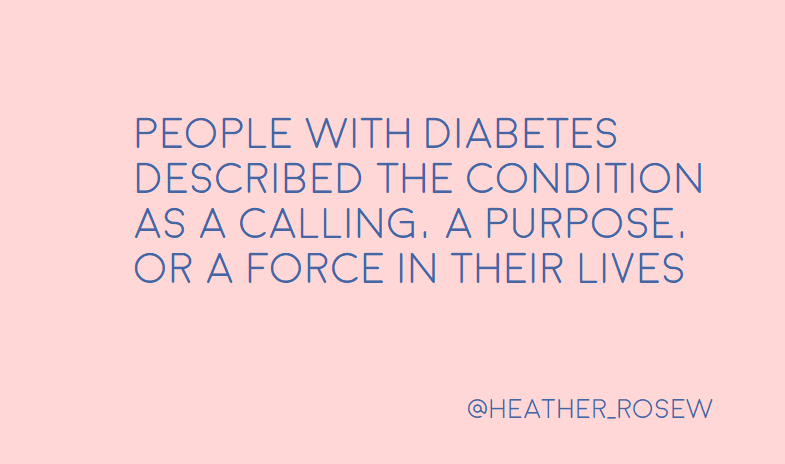
They described a need to DO SOMETHING, to change something. Most said their identity with diabetes involved change-making.
Based on this, I figured the interviewees would have been on the fringe of diabetics at the time who boldly say, "I am a diabetic and it does define me"
Based on this, I figured the interviewees would have been on the fringe of diabetics at the time who boldly say, "I am a diabetic and it does define me"
Surprisingly, when I asked to what extent is diabetes a part of who you are, nearly everyone gave a tidy answer of something like: "diabetes is a part of me, but it isn't all of me". 
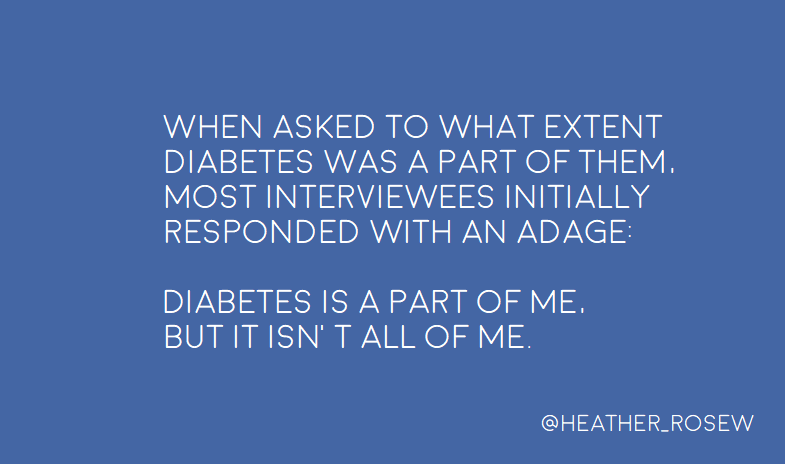
In my first round of analysis, I thought this kind of adage was a partial rejection of diabetes identity. However, after mulling it over and consulting some badass advocates, I leaned into the idea that the adage represents a bi-directional identity defense...
Rather than be a partial rejection of diabetes identity (i.e. not going "all in"), it seemed that saying "diabetes is a part of me, but not all of me" served as a way for PWD to assert to non-diabetics: "You must not reduce my personhood"
And I got to this in an interesting way
And I got to this in an interesting way
After many interviewees gave me this semi-scripted answer, I started asking them to dig deeper.
I began following it up by asking the negation.
I began following it up by asking the negation.
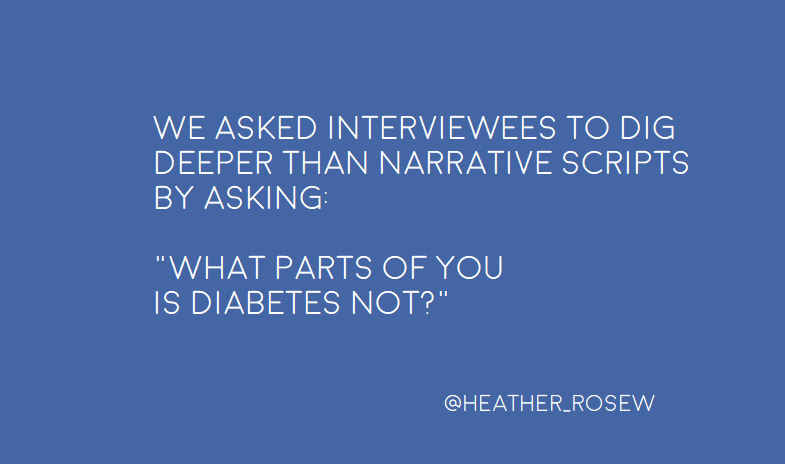
This question threw people like you would not believe!! Crickets. Stumbling. After asking about 3 people this question, I started really asking myself it too.
There are no parts of me that diabetes doesn't bleed into (pun definitely intended). The interviewees said this too.
There are no parts of me that diabetes doesn't bleed into (pun definitely intended). The interviewees said this too.
It was from there that my conceptualization of diabetes identity really took off.
Diabetes identity wasn't about doing diabetes things. It was about having residual diabetes-mindedness embedded in every feeling, every thought, every decision.
Diabetes identity wasn't about doing diabetes things. It was about having residual diabetes-mindedness embedded in every feeling, every thought, every decision.
Diabetes identity was about using the way diabetes seeps into everything to create something, to change something, to make the world better.
Diabetes identity was about change.
doi.org/10.1177%2F1049…
Diabetes identity was about change.
doi.org/10.1177%2F1049…
So, are you ready to see the conceptual model of diabetes identity I built?!? Here it comes....
• • •
Missing some Tweet in this thread? You can try to
force a refresh



